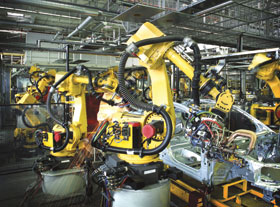Wits EIE taking control of skills development
June 2013
News

The University of the Witwatersrand continues to produce a number of forward-thinking graduates from its School of Electrical and Information Engineering. Commonly known as Wits EIE, the school has an extensive research department that acts as an incubator for advancements in technological development.
Mikail Ansari, recently appointed as an electrical engineer in the Young Professionals Development Programme at Transnet Engineering’s research and development division, believes that the school is the perfect environment for identifying and nurturing the seeds of new technology produced by a concentration of creative thinkers.
According to Ansari, robotics, as a function of automation and control, is an example of a technology set to evolve. “Eventually, the repeatability and precision of robotic systems will allow for the creation of faster and more intelligent devices. While the belief exists that the adoption of robotics results in job losses, this has proved erroneous.
“On the one hand, low-cost outsourcing is already poaching jobs away from the country. This means that robotics might actually help to bring manufacturing back to local areas, which in turn brings with it entire support industries. So instead of jobs being created to do basic work, an entire service industry might be created to service, maintain and operate robots.
“On the other, one needs to be prepared to adapt rapidly to changing demographics and to accept that machines are increasingly undertaking low-skill jobs. This results in a more skilled workforce being needed to operate this machinery, which in turn requires a different educational mindset.”
For these developments to take place, a multi-disciplinary education system must evolve to prepare people with an understanding of multiple engineering disciplines, such as electrical engineering, information engineering, mechanical engineering and civil engineering. Simultaneously, multi-disciplinary teams, as opposed to strictly divided divisions, must develop.
“I think the first step towards achieving this would be inter-departmental awareness between faculties, as well as how departments can collaborate on similar research projects to gain a diversity of skills. Previously seeking out of skills happened at an individual level. The big drive in the future will be to expand this philosophy and adopt it, with integration taking place between the Wits EIE and the University’s other schools of engineering. This will allow for discussion and the development of opportunities that could lead to new technologies,” concludes Ansari.
For more information contact Heather Regenass, University of the Witwatersrand, +27 (0)11 717 7012, [email protected], www.eie.wits.ac.za
Further reading:
RS South Africa shapes future engineering talent
RS South Africa
News
RS South Africa is demonstrating that nurturing future engineers goes beyond traditional classrooms or competitions. On STEM Day, the company shone a light on the full spectrum of its educational initiatives.
Read more...
ABB and Compu-Power bring high-efficiency UPS innovation to IS3 X-Change 2025
News
ABB recently participated in the 31st annual IS
3X-Change 2025 in Cape Town, alongside its long-standing channel partner Compu-Power.
Read more...
Meta and partners announce completion of 2Africa subsea cable system
News
Meta, in partnership with leading global and regional telecommunications companies, has announced the completion and activation of the core 2Africa subsea cable system. This marks a historic milestone in digital infrastructure, establishing what the world’s longest open-access subsea cable system.
Read more...
RS South Africa retains Level 2 B-BBEE status
RS South Africa
News
RS South Africa has once again achieved Level 2 B-BBEE verification.
Read more...
SEW-EURODRIVE unveils world class facility in Gqeberha
News
In a landmark event in the Eastern Cape attended by key customers and industry leaders, SEW-EURODRIVE officially opened its expanded state-of-the-art facility in Gqeberha, marking a major milestone in its strategy to strengthen regional support and deepen its footprint in the region.
Read more...
Africa’s brightest young battery innovators
Schneider Electric South Africa
News
Schneider Electric and Enactus, the international NGO dedicated to inspiring students through entrepreneurial action, have announced the winners of the 2025 Energy Transition Battery Innovation Challenge, funded by the Schneider Electric Foundation. It empowers young innovators to design battery solutions addressing the region’s most pressing energy challenges.
Read more...
Africa’s strategic role in powering the global clean energy future
News
The 2026 Africa Energy Indaba is to spotlight Africa’s mineral wealth, industrialisation potential and the urgent need for sustainable value chain development.
Read more...
Crash reconstruction tests advance vehicle safety research
News
The University of KwaZulu-Natal’s Scientific Multidisciplinary Advanced Research Technologies (SMART) Lab recently participated in a series of collaborative crash reconstruction tests held at the Toyota Test Track.
Read more...
Siemens and HD Hyundai to accelerate revitalisation of USA shipbuilding
News
Siemens Digital Industries Software has signed a memorandum of understanding with HD Hyundai to drive the revitalisation and modernisation of the commercial shipbuilding industry in the USA.
Read more...
Accelerating Africa’s smart manufacturing future
News
Automation Day, a dedicated one-day conference within the Manufacturing Indaba 2026, will bring together industry leaders, innovators and policymakers for an in-depth exploration of how automation is reshaping Africa’s manufacturing landscape.
Read more...


